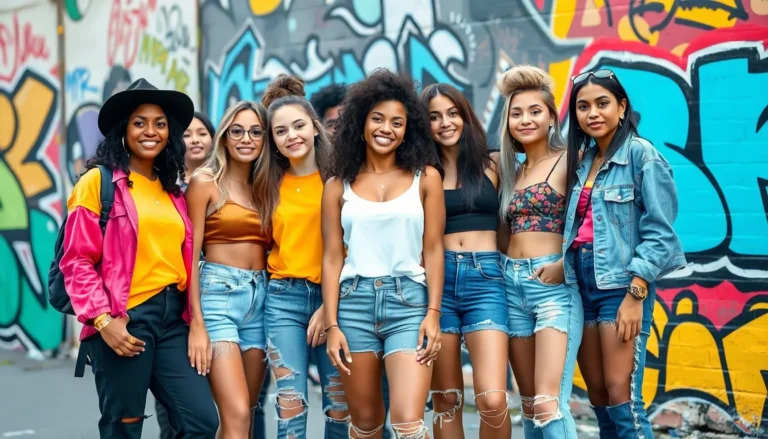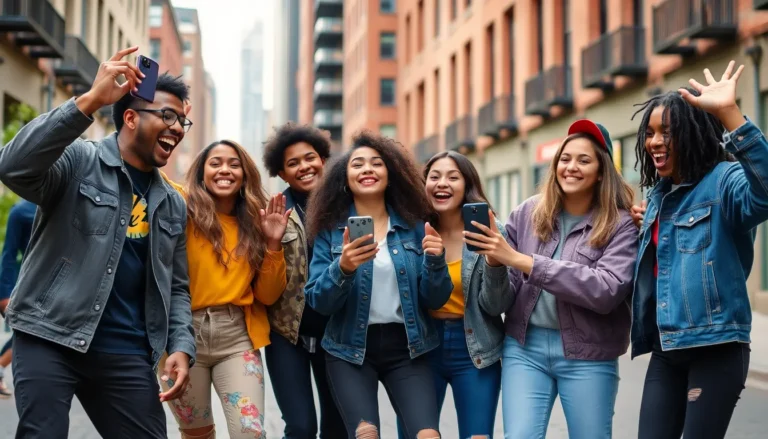Table of Contents
ToggleGen Z isn’t just the future; they’re the now, and their social media habits are shaking up the digital landscape like a TikTok dance challenge gone viral. From quirky memes to the art of the perfect selfie, this generation knows how to capture attention and keep it. But what’s behind their social media magic?
As platforms evolve, so do the trends, and understanding Gen Z’s online behavior is key for anyone looking to connect. Whether it’s the rise of short-form videos or the obsession with authenticity, these trends are more than just fads; they’re shaping how brands communicate and engage. So grab your phone, get comfy, and dive into the world of Gen Z social media trends that are not only entertaining but also essential for anyone wanting to stay relevant in today’s digital age.
Overview of Gen Z Social Media Trends
Generation Z significantly influences social media trends by prioritizing platforms that showcase authenticity and creativity. Platforms such as TikTok and Instagram dominate their online presence, primarily driven by their love for short-form video content. This demographic engages with brands that adopt relatable and genuine marketing strategies, diverging from traditional advertisements.
User-generated content stands out as a critical trend among Gen Z. They actively participate in challenges and trends, often creating their own interpretations. Authentic voices resonate with them, leading to increased brand loyalty when companies encourage this type of engagement.
Content diversity matters. Gen Z embraces a wide range of topics, from social justice issues to mental health awareness. They also favor immersive experiences, such as augmented reality filters and interactive posts, which enhance their social media interactions.
Another key trend is privacy awareness. Gen Z tends to be cautious about data sharing, opting for platforms that provide transparent privacy policies. They prefer ephemeral content, like Stories on Instagram and Snapchat, valuing temporary posts that offer a sense of privacy.
Finally, the emphasis on community is vital. Gen Z strengthens connections through niche online communities centered around specific interests or shared values. This trend highlights an evolving digital landscape where brands focusing on community-building foster deeper relationships with their audience.
Popular Platforms Among Gen Z
Generation Z gravitates toward social media platforms that promote creativity and authenticity, with TikTok and Instagram leading the way.
TikTok’s Rise to Fame
TikTok emerged as a dominant force among Gen Z. Short videos captivate younger users, driving trends across various genres. The platform thrives on user-generated content, where challenges and dance trends foster community participation. Authenticity resonates, with Gen Z preferring genuine connections over polished aesthetics. An estimated 60% of TikTok users belong to this generation, highlighting its central role in their social media experience.
Instagram’s Evolving Features
Instagram continues to adapt to Gen Z’s preferences. The introduction of Reels showcases short-form video content, reflecting TikTok’s influence. Enhanced messaging features facilitate connections within niche groups, while Stories provide a platform for ephemeral content that aligns with Gen Z’s privacy concerns. With over 70% of Gen Z claiming to use Instagram, its innovation keeps the platform relevant. Contests and interactive content, such as polls and quizzes, engage users and encourage participation.
Content Creation Styles
Content creation styles significantly shape Gen Z’s social media engagement. This cohort values authentic and relatable content, gravitating towards creators who mirror their values and experiences.
Authenticity and Relatability
Authenticity drives Gen Z’s connection to content. They prefer brands and creators that exhibit genuine voices and relatable narratives. Approximately 70% of this generation engages more with brands that prioritize transparency. Relatable storytelling resonates well, leading to stronger loyalty. Creating content that reflects shared experiences fosters deeper audience connections. As a result, brands incorporating user-generated content see higher engagement rates. Participation in trends, challenges, and conversations enhances relatability, making authenticity essential for content success.
Short-Form Video Domination
Short-form videos dominate Gen Z’s content consumption. TikTok, where about 60% of users are Gen Z, exemplifies this trend’s popularity. Creators produce attention-grabbing clips that quickly convey messages or entertain. Platforms like Instagram respond by introducing Reels, catering to this short-viewing preference. Engagement spikes when content loops in relatable themes. This generation favors videos that inspire creativity and allow user interaction. Marketers benefit from adapting campaigns to brief, visually appealing formats that capture audience interest fast. Instant gratification drives their preference, dictating content creation strategies.
Engagement and Interaction
Engagement and interaction play crucial roles in reaching Generation Z on social media. This demographic seeks authentic connections and creative expression across their preferred platforms.
Influencer Marketing
Influencer marketing thrives with Gen Z, as they connect with personalities who resonate with their values. About 70% of this generation engages with brands that prioritize transparency and authenticity. Brands leveraging relatable influencers see increased loyalty and trust, as these influencers often showcase user-generated content. Engaging with influencers who participate in Gen Z-centric trends enhances brand visibility. The narrative presented through influencers must reflect genuine experiences to capture and hold attention. Meaningful collaborations lead to campaigns that amplify brand messages effectively.
Community Building
Community building garners significant importance among Gen Z, with niche online groups fostering connections that emphasize shared interests. Approximately 60% of Gen Z members actively engage in communities on platforms like TikTok and Instagram. These platforms allow users to bond over various topics, including social justice and mental health. Brands that prioritize community-focused initiatives create lasting relationships with their audience. Promoting user-generated content within these communities strengthens brand loyalty and creates a vibrant sense of belonging. Building environments where authentic dialogue occurs helps brands connect more deeply with this generation.
The Impact of Mental Health
Mental health plays a significant role in how Generation Z engages with social media. This cohort frequently discusses mental health issues online, helping to normalize conversations around anxiety, depression, and well-being. With approximately 70% of Gen Z prioritizing authenticity, users seek content that resonates with their experiences, fostering deeper connections.
Social media platforms are responding to these needs by creating spaces for mental health dialogues. TikTok hosts numerous mental health advocates and therapists who share advice and coping strategies, creating a supportive community. Features on Instagram allow users to express their feelings through posts and stories, enhancing emotional connection.
The prevalence of mental health content impacts brand marketing strategies. Brands that align with Gen Z’s values often find success in promoting mental wellness and inclusivity. Engaging content around self-care and mental health not only garners attention but also strengthens brand loyalty, as 70% of this demographic prefers transparency and relatable messaging.
Creating safe spaces for mental health discussions is essential. Niche online communities facilitate these conversations, allowing individuals to connect over shared experiences and support one another. With 60% of Gen Z participating in such communities, brands tapping into this need see improved engagement and loyalty.
Diverse representation in mental health content also matters to this generation. They appreciate seeing varied experiences and cultures reflected in discussions, fostering inclusivity. Encouraging these narratives helps brands connect with Gen Z on a deeper level, promoting feelings of belonging and understanding.
Understanding Gen Z’s social media trends is essential for brands aiming to thrive in today’s digital landscape. This generation’s preference for authenticity and community engagement shapes how they interact with content and brands.
By prioritizing relatable storytelling and user-generated content, brands can foster deeper connections with this audience. As platforms evolve to meet Gen Z’s demands for short-form videos and meaningful interactions, staying attuned to these trends will ensure relevance and success.
Embracing these insights allows brands to navigate the complexities of Gen Z’s online behavior and build lasting relationships that resonate with their values.







